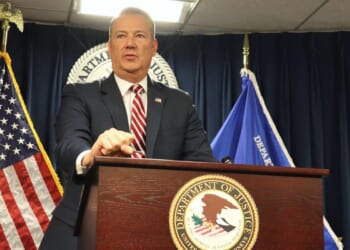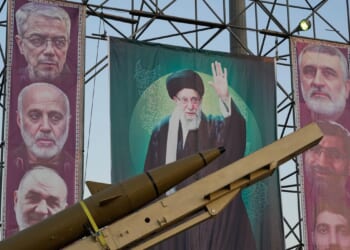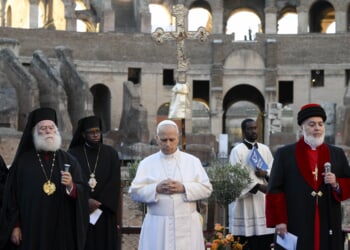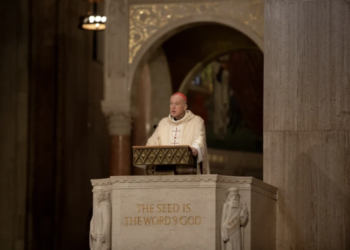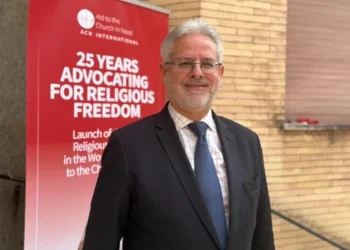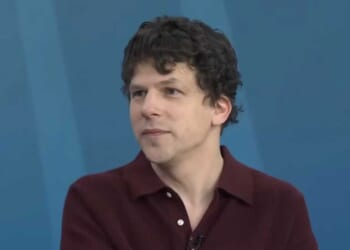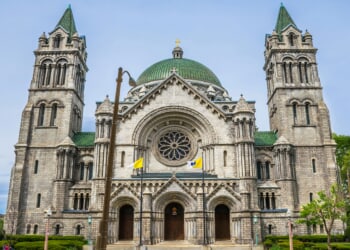On September 18, the first wide-ranging interview of Pope Leo IV was published in a book titled Leo XIV: Citizen of the World, Missionary of the XXI Century. The book, which was published in Spanish, has been described as a “collaboration” with the pope, given that His Holiness was given the opportunity to review it and suggest any changes he deemed necessary. As such, it offers an especially revealing look at who the pope believes himself to be amidst the lingering questions in the secular and religious press on who this new pope truly is.
“Families need to be supported,” he said…. “They call it the traditional family. The family is father and mother and children.”
The New York Times’ interest in the book was to examine the Catholic response to it more than its actual content. That response being, in the Times’ estimation, that Catholics with a variety of political and ideological leanings are continuing to claim, even after the publication of this long-form interview, that the pope fits into their camp. “Liberal? Conservative? Cubs Fan? Catholics Project Many Images Onto Pope,” reads the headline.
I would submit, however, that more interesting is what the pope actually says in the book about himself to Elise Ann Allen, Crux’s senior correspondent in Rome and a fellow American.
Allen, who has affectionate regard for the pope and describes his good character and kindness, began by asking him head-on “Who is Robert Francis Prevost? Who Is Pope Leo XIV?”
The pope’s immediate response was to point to his conviction that every human being is touched by God’s gifts of dignity, goodness, and grace.
He described himself as, “Someone who has a deep appreciation for humanity … a deep faith that, in some way, the mystery of Jesus Christ, God incarnate, reaches all of us. I believe that I have the ability to sit with other people and recognize the goodness in them.”
He then shifted to discussing the traits that shape his approach to dialogue. This is notable given the strong emphasis that the pope has placed on listening to a variety of voices in these first four months of his papacy — an emphasis that has brought about considerable goodwill from many sides amidst division, and perhaps caused, as the New York Times put it, “followers to project their hopes and expectations onto a pope who has so far resisted identifying clearly with any particular camp.”
The pope said, “In conversation, in dialogue, in respect, I am able to see the good, whether the other person is someone of faith or not, and to share some of the happiness and hope of what it means to be alive, the gift of life.”
According to the pope, we should not fear that his end goal is dialogue, and that we will continue forever in a pontificate in which no major decisions are ever made. Answering Allen’s question of what makes him such a respected leader, Pope Leo pointed to two factors: his ability to listen and his ability to be decisive:
I know how to listen, I believe, quite well. When I am with people, I respect everyone’s point of view, but then I also reach a point with them, when it is possible, to say, “We have to make a decision here, friends. Somehow, let’s try to unite everyone’s ideas.” It’s not only about compromise. It’s not only about finding the lowest common denominator. It’s about looking ahead and bringing the people with you as you do it. I’m not a lone ranger, I never have been. It’s the way to build this sense of “We’re in this together,” and, again, respect for every member of the group, of the Church, of the community…. [This is present] in my own formation, certainly based on the sense of the Church of Vatican II, trying to be part of building this kind of Church that truly invites the participation of all of its members.
The pope went on to describe other personal traits that inform his leadership, noting in particular, “I’m adventurous. Some people would use the word brave, others ‘crazy,’ but I’m willing to move forward.” This makes sense given his childhood dream of becoming a missionary in Africa that he revealed at another point in his interview and his many years persisting despite facing grave dangers as a missionary in Peru. He then, quite assuredly, spoke of his own decisiveness:
I am capable of being decisive when it is necessary to be decisive, which is another aspect of leadership that sometimes people lack. You can’t just go around in circles thinking, “Let’s think about this and talk about this forever.” You have to make decisions in order to move forward. I’m capable of doing that, and I’m not afraid to do that. You don’t always make the right decision, sometimes you make mistakes, but I guess the people have the sense that they feel invited, they feel listened to, and they know that there will be progress on something.
This sense of decisiveness comes amidst his very “synodal” papacy, synodality being to him “an attitude, an openness, a willingness to understand.” Synodality is an “important dimension,” he said, of “how we live our life as the Church.” He said it “consists in each of its members having a voice and a role to play through prayer, reflection.”
One means through which we can see how the pontiff puts this method of listening and decisiveness into action is through how he approaches in his interview the, as he put it, “hot-button” issue of homosexuality.
While much of the pope’s interview with Allen is only available in Spanish translation in the book, the portion in which he discusses the LGBTQ issue was published by Crux in video form in the original English.
The pontiff explained that in the “back of [his] mind” on this issue is a comment from a cardinal from the eastern part of the world, who said that the Western world is “fixated, obsessed with sexuality.” It’s at the back of his mind, Pope Leo said, “because of what I’ve already tried to demonstrate and live out in terms of my understanding of being whole at this time in history. I’m trying to not continue to polarize, promote polarization in the church.”
The pope gestured toward welcoming and inviting everyone, regardless of sexual identity: “And I am trying to say, this is what Pope Francis said very clearly when he would say ‘Todos, Todos, Todos,’ everyone’s invited in. But I don’t invite a person in because they are or are not of any specific identity. I invite the person in because he’s a son or daughter of God.”
Then the pope made the comments that have drawn attention. He said, “I mean obviously at some point people want Church doctrine to change and they want attitudes to change. I think we have to change attitudes before we ever change doctrine. I find it highly unlikely, certainly in the immediate future, that the Church’s doctrine, in terms of what the church teaches about sexuality, what the Church teaches about marriage [will change].”
The phrase “I think we have to change attitudes before we ever change doctrine” could be interpreted as motioning toward the idea that a change in doctrine on this matter would be good but that changing attitudes first would be necessary. But Jonathan Liedl wrote this week in the National Catholic Register that he found “compelling” the explanation that the pope chose these words because he decided they were “the best way to lower expectations for change without necessarily pushing away those who have come to expect it as a possibility.” The “non-reaction of the Church” to these words, Liedl explains, comes in the context of a papacy in which the “interpretive key” is the pope’s effort to foster unity.
Notably, Crux, as well as the Spanish translation in Allen’s book, have transcribed this pertinent phrase from the pope differently than I heard it, and I rolled the tape four times. Allen’s version of the quote says, “[W]e have to change attitudes before we even think about changing what the Church says about any given question.” This softens and generalizes the pope’s comments. Perhaps the pope, who reviewed the book, wanted to clarify his comments.
Regardless, the pope, while gesturing openness toward those concerned with getting the Church to accept homosexuality, softly said that he finds it “highly unlikely” that the Church’s doctrine on the matter will change in the “immediate future.” Later, he said more firmly, “But I think that the Church’s teaching will continue as it is, and that’s what I have to say about that for right now.”
The pope also used the opportunity to discuss the centrality to society of marriage, specifically meaning a man and a woman united together. “Families need to be supported,” he said. “They call it the traditional family. The family is father and mother and children. I think that the role of the family in society, which has at times suffered in recent decades, I think that that once again has to be recognized, strengthened.”
Interestingly, Pope Leo discussed the possibility that divisions in society today might emerge from the fact that many have been deprived of the opportunity to grow up in a traditional family. “And I just wonder,” he said, “about if the question about polarization and how people treat one another doesn’t also come from situations where people did not grow up in the context of a family where we learn, that’s the first place you learn how to love one another, how to live with one another, how to talk with one another, and how to form the bonds of communion. That’s the family. If you take away that basic building block, it becomes very difficult to learn that in other ways.”
The pope also, in the context of this discussion, made perhaps the first decisive action on a matter of import and controversy. He stated that the published rituals of blessing “people who love one another” in Germany go “specifically against the document that Pope Francis approved, Fiducia Supplicans.” The late pontiff’s document allows for “non-liturgical” blessings of couples in “irregular relationships,” including same-sex relationships, but calls for “spontaneous blessings.” A later press release clarified that these blessings should not take place in a prominent place, suggested that a “catechesis” explaining “that these types of blessings are not an endorsement of the life led by those who request them” might be necessary alongside the blessing, and said that such blessings should be “neither liturgical nor ritualised.”
Here we have the pope listening to those from various sides on an issue of import, offering a posture of unity, giving a (mostly) conclusive answer: “I think that the Church’s teaching will continue as it is,” and stating decisively opposition to the manner in which certain German bishops have conducted themselves in regard to blessings for same-sex couples. Whether he will go beyond simply stating his opposition to such blessings remains unclear for the time being.
On Friday, the pope also put on display the decisiveness he advertised when he made his first major appointment. He filled his previous, powerful spot as prefect of the Dicastery for Bishops. Archbishop Filippo Iannone, who is currently prefect of the Dicastery for Legislative Texts, and is known for being a level-headed veteran bureaucrat and canonist, will take on the role of helping the pope to select bishops. Iannone notably had a hand in efforts to curtail the rebellious German church’s “Synodal Way,” which, among other things, called for the creation of a “synodal committee” consisting of bishops and laypeople who would make major decisions. Pope Leo, before he was named pope, was one of the top Vatican officials working to resolve the German issue, and it is known that he is seeking to learn German, potentially to help deal with the crisis created by the German Church.
One Vatican source close to the Jesuit America magazine said that the pope’s selection of Iannone was “an enigma” and “difficult to decipher.” An alternative interpretation is that Archbishop Iannone will bring a steady hand and a dedication to thoroughness and procedure.
As the pope continues to shift from his period of listening to one of decisiveness, it’s worth noting what Leo said is the most “fundamental role” of the successor Peter: confirming others in the faith. “Being pope, successor to Peter, asked to confirm others in their faith, which is the most important part, is also something that can happen only by the grace of God,” he said.
*****
The pope made one more thing clear in his interview: He feels a strong connection to his American identity. While I’m sure the pope loves Peru, and he has said so, the reality is that he obtained Peruvian citizenship because it was a requirement for being a bishop there. This is a man who is obsessed with Peeps, loves Midwestern roadtrips, and whose father served in the Navy in World War II. And so, when the pope was asked if he identifies more as a Peruvian or as an American, he said, “I’m obviously an American, and I very much feel that I’m an American.” Peru, he added, “is a part of who I am.”
READ MORE from Ellie Gardey Holmes:
‘Sexual Life of Colonialism’ Professor Denied Tenure at Harvard

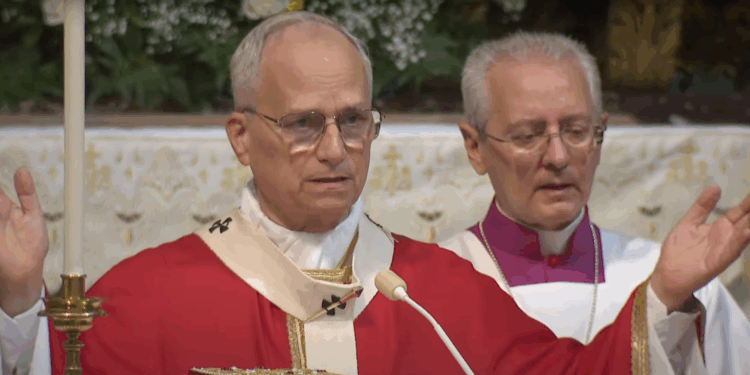
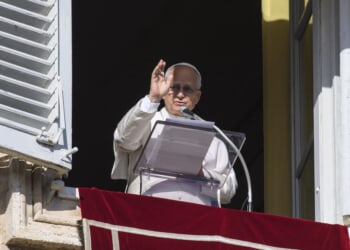
![Scott Bessent Explains The Big Picture Everyone is Missing During the Shutdown [WATCH]](https://www.right2024.com/wp-content/uploads/2025/11/Scott-Bessent-Explains-The-Big-Picture-Everyone-is-Missing-During-350x250.jpg)





